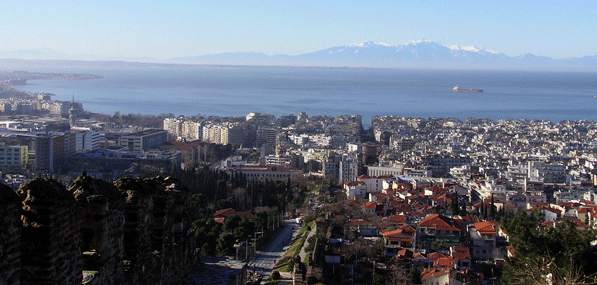(lubavitch.com) A recent anti-Semitic tirade by a high-ranking Greek orthodox priest on the nation’s largest television network has brought international condemnation. The priest, the Metropolite of Piraeus Seraphim blamed world Jewry for Greece’s financial problems, drawing on age old stereotypes and conspiracies.
“Adolf Hitler was an instrument of world Zionism and was financed from the renowned Rothschild family with the sole purpose of convincing the Jews to leave the shores of Europe and go to Israel to establish the new Empire,” he told a Mega TV reporter.
Both Jewish and Greek organizations were quick to condemn the Metropolite. In a statement issued by a spokesman for the Greek Prime Minister George Papandreou, he called the words of the Metropolite, an “insult to Greece … They insult our very society of which the Greek Jewish Community is an inseparable part.”
While physical violence against Greek Jews is rare, the statements of the Metropolite are not isolated in nature. Similar statements were made by the Metropolite Anthimos in Thessaloniki and last year the the Etz Hayyim Synagogue in Hania, Crete was subject to an arson attack.
“Community members, many of them Holocaust survivors and their descendants, are obviously greatly disturbed by the statements of the Metropolite.” says Rabbi Mendel Hendel, Chabad-Lubavitch emissary to Athens, Greece.
Hendel is quick to note, however, that an outpouring of support from neighbors and the Greek media’s condemnation of the statement is a sign of the positive relationship with Greek society as a whole.
According to Donna Lilian Capon, the Secretary General of Central Board of Jewish communities in Greece, many in her country are unaware of the role Jews played in Greek history. “My family has been in Greece for over 500 years,” Capon laments. “Yet even today when I tell people I’m Jewish, they ask me when I moved from Israel.”
The first organized communities in Greece appeared around 400 B.C.E. Since then Jews have played an active role in Greek society, with Jewish merchants holding key positions in Mediterranean shipping lanes. As early as the first century B.C.E., Greek speaking Jews spread across the Balkans and Asia minor, settling along the Black Sea in what are today parts of Turkey and the Crimean peninsula. After the Spanish Expulsion in 1492, Sephardic Jews sought refuge in Greece, where they were welcomed by then rulers, the Ottoman empire. Soon these refugees formed their own communities, culturally separate from the Romaniotes – the indigenous Jewish population – in Thessaloniki and Athens.
On the eve of the Holocaust, 76,000 Jews lived in Greece, where they made up as much as half the population in cities such as Thessaloniki. Under Nazi occupation 86% percent of Greek Jewry were murdered, most of them dying in Auschwitz. Those who returned found their communities and synagogues destroyed. Most survivors ultimately emigrated to Israel or America. Today only 5,000 Jews remain, living mostly in Athens and Thessaloniki.
In light of the recent statements, the Ministries of Education and Religion in Athens have been contacted about broadening awareness of Greek Jewish history.
Capon sees anti-Semitism in Europe as a “sickness that is very difficult to eradicate.” Only through education “will we make steps towards ending the ignorance and hate.”
Hendel also sees the need for increased education in Greece. It is the need for Jewish education and increased Jewish identity within the Jewish population, he emphasizes, that he sees as an equally pressing issue.
“The Jewish community itself is very well organized.” Hendel says, referring to the two synagogues, school and Jewish community center run in Athens. “However for those not currently involved, assimilation is the greatest threat to Jewish life in Greece today.”
The Hendels currently offer a series of educational programs, including a Sunday school that attracts about 70 local children, and holiday awareness programs.
It seems that the work the Hendels have put in is beginning to pay off. “The younger generation clearly yearns to know more about their heritage.” Hendel says.
Chabad maintains two full-time emissaries in Athens and Thessaloniki as well sending rabbinical students to communities across the country as part of the Merkos Rabbinical Visitation program.

Be the first to write a comment.